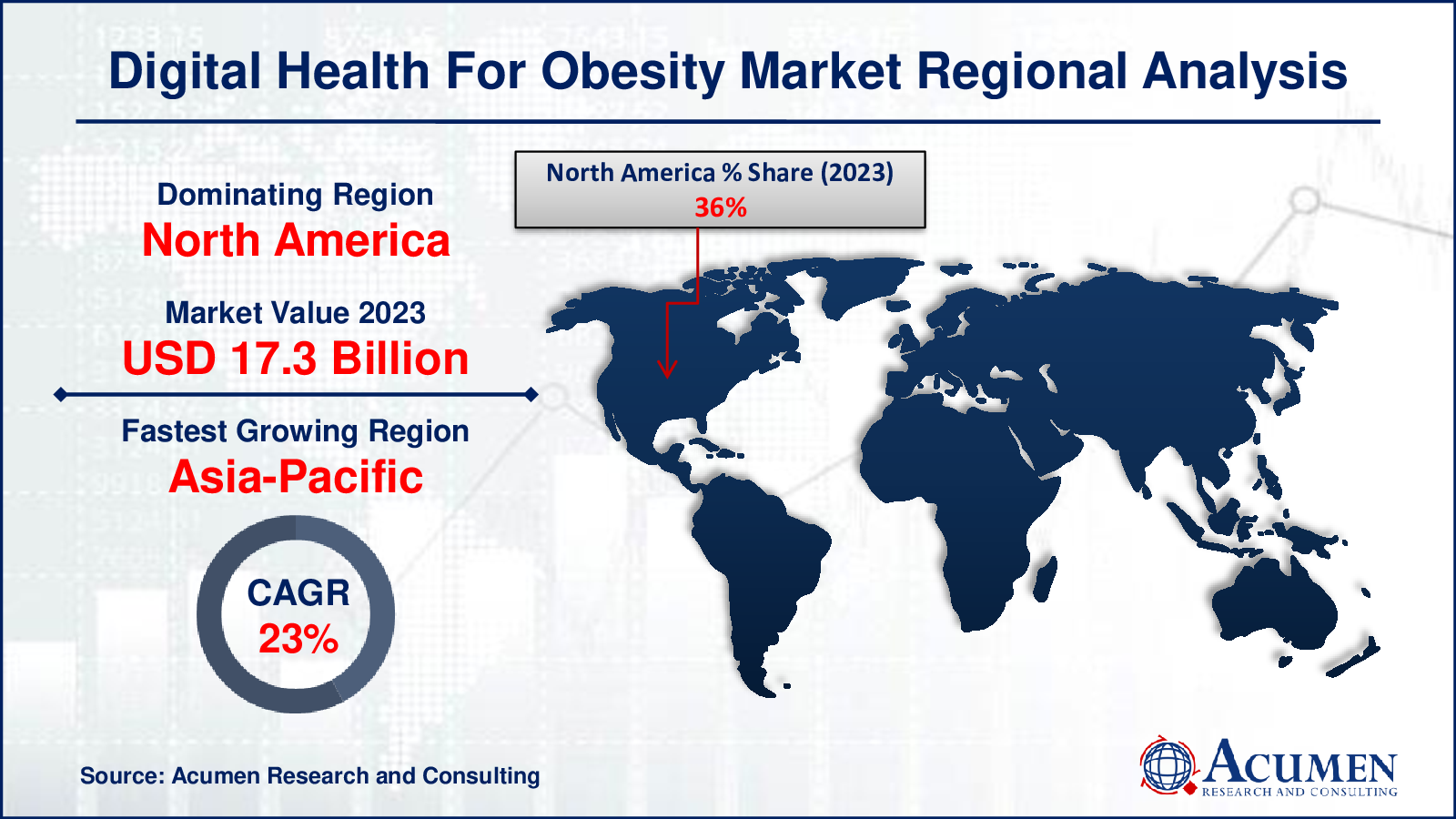The growth of the Digital Health for Obesity Market, which was valued at USD 48.1 Billion in 2023 and is expected to reach USD 276.5 Billion by 2032, growing at a CAGR of 21.7% from 2024 to 2032. Explore market trends, opportunities, and key insights.
The Digital Health for Obesity Market has seen significant expansion, fueled by the increasing global prevalence of obesity and the incorporation of cutting-edge digital technologies in healthcare. This market includes a wide range of digital tools and platforms designed to support the prevention, management, and treatment of obesity. The rise of wearable devices, mobile apps, telemedicine, and AI-driven analytics is transforming how obesity is managed worldwide. Valued at USD 48.1 billion in 2023, the market is anticipated to grow to USD 276.5 billion by 2032, representing a compound annual growth rate (CAGR) of 21.7% from 2024 to 2032.
Digital Health for Obesity Market Dynamics for Digital Health for Obesity
Key Digital Health for Obesity Market Drivers:
- Rising Global Obesity Rates: The global obesity epidemic, which has seen obesity rates triple since 1975 according to the World Health Organization (WHO), is a major driver of market growth. Over 650 million adults are affected, prompting a heightened demand for innovative digital health solutions.
- Increased Adoption of Digital Health Technologies: The rapid integration of digital health technologies such as mobile health (mHealth) apps, wearable devices, and telemedicine platforms is a critical growth factor. These technologies provide real-time monitoring, personalized interventions, and improved patient engagement, making them vital in combating obesity.
- Shift Towards Value-Based Care: The move towards value-based care models in healthcare emphasizes outcomes and efficiency. Digital health solutions for obesity align with this trend by offering scalable, cost-effective interventions that enhance patient outcomes while reducing healthcare expenses.
- Advancements in AI and Data Analytics: Artificial Intelligence (AI) and data analytics have revolutionized obesity management by enabling personalized and sophisticated approaches. These technologies facilitate tailored interventions, improving treatment effectiveness and adherence.
Download Sample Report Copy of This Report from Here: https://www.acumenresearchandconsulting.com/request-sample/3683
Digital Health for Obesity Market Restraints:
- Limited Reimbursement Policies: Despite the growth in digital health solutions, limited reimbursement policies in many regions hinder market expansion by restricting access, particularly for low-income populations.
- Privacy and Security Concerns: The reliance on digital technologies raises concerns about the privacy and security of sensitive health data. Protecting patient information is crucial, as breaches could erode public trust and slow market growth.
Opportunities for Digital Health for Obesity Market Expansion:
- Development of Personalized Interventions: The increasing demand for personalized healthcare offers significant opportunities for the digital health for obesity market. AI and data analytics enable the creation of highly customized interventions, improving treatment outcomes and patient satisfaction.
- Expansion of Telemedicine and Remote Monitoring: Telemedicine and remote monitoring present substantial growth potential, especially in areas with limited access to traditional healthcare. These technologies allow for continuous patient monitoring and real-time intervention, enhancing accessibility and effectiveness in obesity management.
Digital Health for Obesity Market Segmentation:
- By Component:
- Software: Essential for tracking diet, physical activity, and health metrics, offering actionable insights and personalized recommendations.
- Services: Includes telemedicine consultations, personalized coaching, and behavioral therapy, which held the largest market share in 2023.
- Hardware: Includes wearable devices for monitoring vital signs and activity levels, providing real-time data for users.
- By End-Use:
- Patients: Expected to grow significantly as more individuals use digital health technologies for weight management.
- Payers: Insurance companies and government health agencies are investing in digital solutions to mitigate the economic burden of obesity.
- Providers: Healthcare providers are integrating digital tools into their programs to offer personalized care and improve patient outcomes.
- Others: Includes wellness programs, fitness centers, and corporate wellness initiatives using digital technologies to promote healthy lifestyles.
Digital Health for Obesity Market Regional Analysis:
- North America: Leading the market with a strong ecosystem of technology companies, healthcare providers, and research institutions, supported by high obesity rates and a focus on innovation.
- Europe: Significant market presence with leading countries like the U.K., Germany, and France adopting advanced obesity management solutions.
- Asia-Pacific: Expected to experience the fastest growth with a CAGR of over 22.9% due to rapid urbanization, rising obesity rates, and increasing digital technology adoption.
- Latin America and the Middle East & Africa: Emerging markets with growing awareness of obesity-related health issues and a rising interest in cost-effective digital health solutions.
Competitive Landscape:
Key players in the market include:
- MyFitnessPal
- WW International
- Teladoc Health, Inc.
- Healthify (My Diet Coach)
- Fitnesskeeper Inc.
- Fitbit, Inc.
- WellDoc
- BioAge Labs
- PlateJoy HEALTH
- Noom
- Tempus
- Sidekick Health
These companies are pioneering innovative digital health solutions to address obesity, from mobile apps and wearables to telemedicine platforms and AI analytics.
Strategic Recommendations:
- Invest in AI-Driven Personalization: Enhance patient engagement and treatment outcomes by developing AI-driven personalized solutions.
- Expand Telemedicine Capabilities: Focus on broadening telemedicine services to improve access and care.
- Enhance Data Security Measures: Implement robust security measures to protect patient data and maintain public trust.
Digital Health for Obesity Market Conclusion: The Digital Health for Obesity Market is rapidly advancing, offering innovative solutions to address one of the most pressing public health issues today. With ongoing technological advancements and a focus on personalized, value-based care, the market is set for substantial growth. Companies can gain a competitive edge by leveraging AI, expanding telemedicine capabilities, and ensuring robust data security.
To Purchase this Premium Report@ https://www.acumenresearchandconsulting.com/buy-now/0/3683
Mr. Richard Johnson
Acumen Research and Consulting
India: +918983225533
E-mail: sales@acumenresearchandconsulting.com
Browse for more Related Reports:
